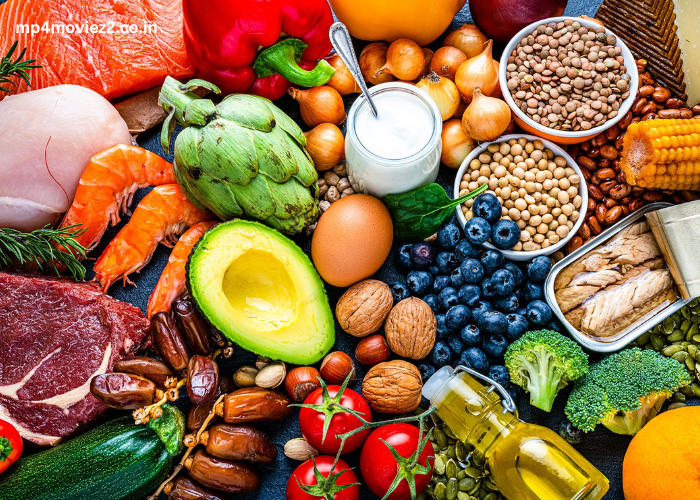As we head into 2025, achieving peak health requires more than just exercising or relying on supplements. True wellness begins with the food you consume. Nutrition is the foundation of overall health, fueling the body, promoting longevity, boosting immunity, and enhancing mental clarity. Whether you’re looking to lose weight, build muscle, improve your energy, or support your immune system, understanding the essentials of nutrition is key.
This guide will help you navigate the world of nutrition, offering actionable advice on how to fuel your body for peak performance in 2025. From adopting balanced eating habits to including nutrient-dense superfoods in your diet, this ultimate nutrition guide will ensure that you’re equipped to achieve and maintain your best health.
Key Points:
- A well-rounded diet that emphasizes whole foods is crucial for long-term health.
- Superfoods and nutrient-rich foods play a major role in boosting immunity and energy.
- Hydration and mindful eating habits are essential for overall well-being.
What Does Nutrition for Peak Health Look Like?
Nutrition for peak health in 2025 focuses on nourishing the body with a wide variety of whole, nutrient-dense foods. Gone are the days of extreme fad diets and restrictive eating; today, it’s about balance, sustainability, and consistency.
Essential Components of a Peak Health Diet:
- Variety of Fruits and Vegetables: The more colors on your plate, the better! Aim to include a range of fruits and vegetables to ensure you’re getting diverse nutrients.
- Lean Proteins: These support muscle building and repair. Focus on plant-based proteins (like beans and tofu) and lean animal proteins (like fish, chicken, and eggs).
- Healthy Fats: Omega-3s, found in foods like avocados, nuts, and fatty fish, promote brain function and heart health.
- Whole Grains: These provide fiber, which is essential for digestion, as well as sustained energy throughout the day.
In 2025, nutrition for peak health is all about balance and personalization. Everyone’s nutritional needs are unique, so experiment with different foods to find what works best for your body. Remember, moderation is key—never deprive yourself of the nutrients your body needs to thrive.
| Food Group | Benefits | Examples |
|---|---|---|
| Fruits & Veggies | Rich in vitamins, antioxidants, fiber | Berries, spinach, carrots |
| Lean Proteins | Supports muscle health, hormone production | Chicken, fish, tofu, eggs |
| Healthy Fats | Improves brain function, reduces inflammation | Avocados, olive oil, walnuts |
| Whole Grains | Boosts energy, supports digestive health | Quinoa, oats, brown rice |
How Can Superfoods Help Achieve Peak Health in 2025?
Superfoods are the heroes of any nutrition plan, offering high concentrations of essential vitamins, minerals, and antioxidants. These nutrient-dense foods support a wide range of bodily functions, from immune defense to energy levels to mental clarity.
Top Superfoods for Peak Health in 2025:
- Berries: Blueberries, strawberries, and blackberries are packed with antioxidants, which help reduce inflammation and protect cells from damage.
- Leafy Greens: Kale, spinach, and collard greens are rich in fiber, iron, and vitamins A, C, and K, promoting heart and digestive health.
- Salmon: Full of omega-3 fatty acids, salmon helps support brain health and reduce inflammation.
- Chia Seeds: These tiny seeds are packed with fiber, protein, and omega-3s, which help with digestion, cardiovascular health, and brain function.
- Turmeric: Known for its anti-inflammatory properties, turmeric can boost your immune system and reduce the risk of chronic diseases.
Incorporating a variety of superfoods into your meals can help elevate your overall nutrition. Note: Try to incorporate at least one superfood in every meal to reap the maximum health benefits.
| Superfood | Benefits | Examples |
|---|---|---|
| Berries | High in antioxidants, supports brain health | Blueberries, strawberries, raspberries |
| Leafy Greens | Rich in vitamins, fiber, and iron | Kale, spinach, arugula |
| Salmon | Omega-3 fatty acids support brain health | Wild-caught salmon, mackerel |
| Chia Seeds | High in omega-3s and fiber | Chia seeds (can be added to smoothies or yogurt) |
| Turmeric | Anti-inflammatory, supports immune health | Use in curries, smoothies, or teas |
Why Is Hydration Key to Peak Health?
Staying hydrated is fundamental to achieving peak health. Water makes up a large percentage of our bodies and plays an essential role in nearly every bodily function. Without proper hydration, energy levels can dip, digestion can slow, and cognitive function can decline.
Tips for Staying Hydrated:
- Drink Water Throughout the Day: Aim to drink at least 8 glasses of water a day, adjusting for physical activity and climate.
- Incorporate Hydrating Foods: Foods like watermelon, cucumbers, and oranges help replenish fluids while providing additional nutrients.
- Avoid Excess Caffeine and Sugary Drinks: While coffee and soda are popular, they can dehydrate your body and contribute to energy crashes. Opt for herbal teas or infused water instead.
Hydration doesn’t just support physical health—it also helps maintain clear skin, aids in digestion, and improves mental focus. Reminder: Carry a water bottle with you to stay hydrated throughout the day.
| Hydration Source | Benefits | Examples |
|---|---|---|
| Water | Keeps body hydrated, aids digestion | Plain water, herbal teas |
| Hydrating Foods | Provides hydration along with essential nutrients | Watermelon, cucumber, oranges |
| Limit Sugary Drinks | Avoids dehydration and blood sugar spikes | Reduce soda, limit energy drinks |
How Can Mindful Eating Improve Your Health in 2025?
Mindful eating involves paying full attention to what and how you eat. It’s about being present with your meals, savoring each bite, and listening to your body’s hunger and fullness cues. In 2025, mindful eating can help prevent overeating, reduce stress, and improve digestion.
Tips for Mindful Eating:
- Eat Slowly: Give yourself time to enjoy each bite and focus on the flavors and textures of your food.
- Listen to Your Body: Only eat when you’re hungry, and stop eating when you’re satisfied, not overly full.
- Avoid Distractions: Turn off the TV and put away your phone while eating to stay focused on your meal.
Mindful eating helps create a healthier relationship with food, promoting a balanced diet and reducing the temptation to indulge in unhealthy habits. Note: Practice mindfulness regularly to foster a greater sense of control over your eating habits.
Conclusion: Embrace Nutrition for Peak Health in 2025
Achieving peak health in 2025 requires a holistic approach to nutrition, focusing on balanced eating habits, nutrient-rich superfoods, proper hydration, and mindful eating practices. By incorporating these key principles into your daily life, you’ll improve your physical, mental, and emotional well-being.
To make the most of your health, choose nutrient-dense foods that support your long-term goals and foster a sustainable, healthy lifestyle. Whether you’re looking to boost your energy, support your immune system, or improve your digestion, the right nutrition will set you on the path to success.
FAQ’s
- What are the most important foods to eat for peak health? The most important foods include a variety of fruits and vegetables, lean proteins, whole grains, and healthy fats.
- What are some superfoods to include in my diet? Top superfoods include berries, leafy greens, salmon, chia seeds, and turmeric, all of which provide essential nutrients and health benefits.
- How much water should I drink for peak health? Aim for at least 8 glasses of water a day, adjusting based on your activity level and environmental factors.
- What is mindful eating, and how can it help me? Mindful eating involves paying full attention to your food, eating slowly, and listening to your body’s hunger and fullness signals. It can improve digestion, prevent overeating, and promote healthier eating habits.
- How do superfoods improve health? Superfoods are nutrient-dense and packed with antioxidants, vitamins, and minerals that help reduce inflammation, boost immunity, and support overall wellness.




